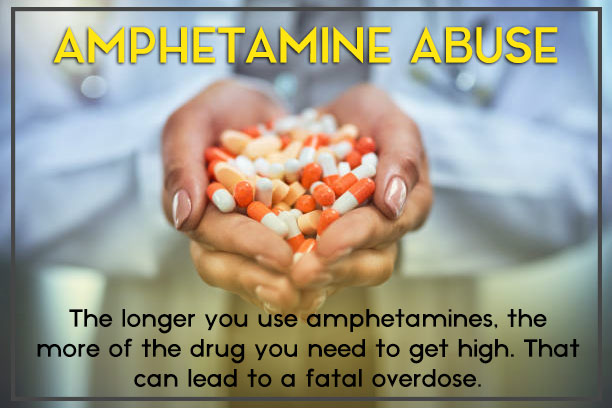During World War II, the amphetamine Benzedrine became a wakefulness aide for soldiers. Sleep wasn’t easy to accomplish on the battlefield, and soldiers needed to stay alert despite fatigue.
One estimate says that as many as 16 million Americans used Benzedrine pills. When the war ended, America’s love affair with amphetamines did not.
Instead, women started using amphetamines as a weight loss aid thanks to its ability to suppress appetite. It also got marketed as a fix for depression, and before too long, the country was in the midst of an amphetamine epidemic that peaked in the 1960s.
Nowadays, public health experts are more likely to view opiates and opioids as the biggest threat, and they are a real problem. However, amphetamine abuse has never gone away.
Read on to find out how to recognize signs of amphetamine addiction.
What Is an Amphetamine?
Before going any further, it’s a good idea to define what exactly counts as an amphetamine.
Amphetamines stimulate the central nervous system. They do this by upping the chemical activity in a person’s brain.
There are multiple types of amphetamines. The one you’re most likely to hear about in the news is methamphetamine, better known as simply meth.
Meth can be clear, which is where the term “crystal meth” comes from. It’s snorted, smoked, injected in the veins, or swallowed in pill form. The high is short-lived but incredibly potent, which is why people keep going back for more.
While meth isn’t legal, there are certain types of amphetamines that are legally prescribed every day.
Adderall is an amphetamine commonly used to treat Attention Deficit Hyperactivity Disorder, or ADHD. The renewed sense of focus and alert can feel helpful, but it can also get addictive fast.
On college campuses, it’s common for students to pass around Adderall when they’re cramming for tests. It’s one of the so-called “study drugs” that are especially popular on Ivy League campuses and in other environments where the pressure to overachieve is intense.
The vast majority of these students don’t have an ADHD diagnosis, but they’re using an amphetamine anyway because they think it gives them an edge. They also view it as not that harmful.
Amphetamines like meth are often seen as a problem for people in poverty, while prescription amphetamines like Adderall get viewed as a drug for the well-off and well-educated.
What Amphetamine Abuse Looks Like
Amphetamine abuse disorder can lead to both physical and psychological symptoms of addiction. We’ve already mentioned an increased sense of focus and a decreased appetite, but those are far from the only physical symptoms associated with amphetamine drugs.
Dilated pupils are a big indicator that someone is taking amphetamines. It’s also one of the biggest ways that other people in the addict’s life realize something is up.
Of course, the person with dilated pupils can say they just got back from a visit to the eye doctor. That may be true once, but if they have dilated pupils almost every time you see them, then you need to pay attention for other warning signs.
Social Symptoms of Amphetamine Abuse

Their body temperature may be higher as well, and they’re likely breathing faster. As charismatic as they can be, they’re also less likely to pick up on certain cues. For instance, a sober person would quickly realize that they’re talking about an uncomfortable subject and shut up.
But a person on amphetamines might keep talking and talking and talking. It doesn’t matter if anyone is listening or not; they have a lot to say anyway.
A lot of people with substance abuse issues get less and less reliable as they fall further under the spell of the drug or drugs. That’s true with amphetamines as well.
For the amphetamine user, it can feel like an exciting relationship that they also want to think about and focus on. It dominates their life and they’re fine with that.
Risks Increase over Time
But if you love someone with an amphetamine addiction, you’ll likely notice that they’re harder to get in touch with. They’ll show up either late or not at all for parties and other social events, and they’re often less productive at work too.
Addiction can be like an eraser that removes everything you love about a person and replaces it with an all-consuming craving for more of amphetamines. The longer a person uses, the more likely they are to develop symptoms like anxiety, aggression, and paranoia.
They can start hallucinating or convulsing. They take more risks, including sometimes sexual ones. Their muscles will tense and their vision will blur.
The longer you use amphetamines, the more of the drug you need to get high. That can lead to a fatal overdose.
Treating Amphetamine Addiction
As usual, treatment has to begin with the addicted party realizing they have an issue, then working to address it. If someone in your life finally admits to a methamphetamine addiction, offer to take them to a detox program.
Withdrawal symptoms can include panic attacks and confusion. Users who go off the drug can get depressed and even suicidal because they can’t imagine living an enjoyable life without amphetamines.
Additionally, the appetite that was gone for so long can return in full force, which often means weight gain.
To treat these symptoms, some doctors will prescribe a mild stimulant to bridge the gap. Detox is vital in the short-term, but a variety of treatments can be effective in the long-term.
The most important thing an addict can do is develop a treatment plan with a team of medical experts, and then stick to it. That includes knowing what triggered past amphetamine use, then trying to avoid those triggers in the future.
Finding Help
If you love someone who is dealing with amphetamine abuse, it’s hard to know what to say to them. There’s no combination of magic words that will get them to realize the full scope of the issue.
In the meantime, you can try to give them as much support as possible without risking your own health.
If you want to do additional research on rehab and addiction, feel free to look at our blog.Most PPO Health
